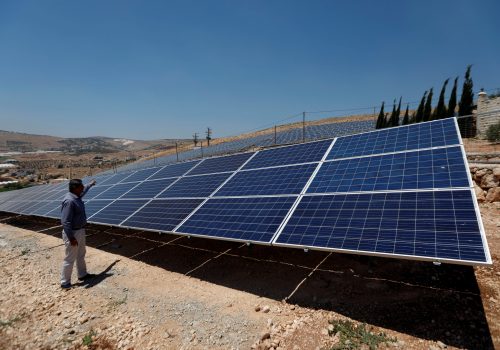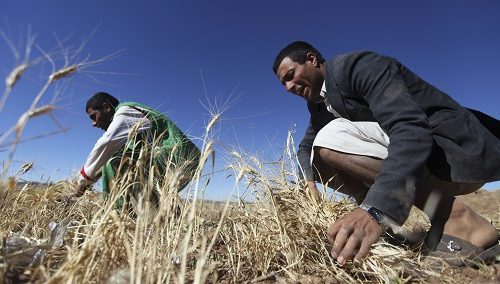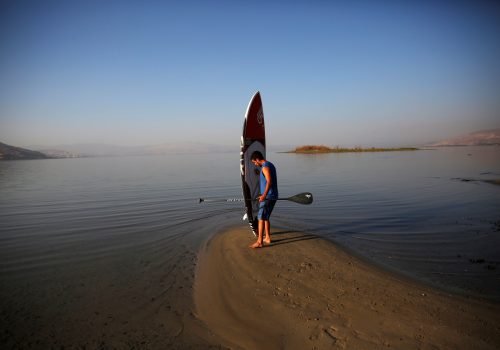The Middle East needs a Levant-North African Environmental Forum
As the Joe Biden administration looks to address the climate crisis while playing an active role in promoting peace in the Middle East, it is worth considering supporting local actors in the region in their common fight against climate change. The appointment of John Kerry, who is very familiar with the region, as Special Presidential Envoy for Climate is an important step in this regard. Working with Secretary of State Antony Blinken, Kerry may wish to consider playing a leadership role in tackling some of the greatest climate change-related challenges in the Middle East while fostering local cooperation. This would align firmly with the Biden administration’s commitment to fighting climate change at home and abroad and to building new bridges in the region.
Recent regional agreements aside, there remains a need to see enhanced institutional operational cooperation in the environmental arena in the MENA region. Such critical environmental cooperation must transcend national politics to be successful. In the past we have witnessed, for example, raw sewage discharged into the Mediterranean from Gaza’s sewage treatment plants, which failed to operate due to electricity outages in the Strip, thereby contaminating the neighboring Israeli beaches of Ashkelon. More recently, in February 2021, devastating oil spills hit Israeli beaches and spread to neighboring Lebanese ones. Cooperation on such a disaster is not an option but a necessity if citizens wish to continue enjoying beaches and Mediterranean fish. Settling the Israeli-Lebanese disputed maritime border—a disputed area of about 860 km2—with US mediation is critical in this regard, not only in terms of the offshore gas reserves but also in dealing with common environmental challenges. This, of course, requires cooperation at the national and international levels.
For starters, there needs to be a way for the Lebanese Environment Minister—or perhaps a non-political official from the ministry—to call his Israeli counterpart (despite the absence of diplomatic relations between the two countries) to jointly tackle an unfolding real-time disaster without the fear that immediate tweets and other cynical political narratives will be made by either Israeli or Lebanese officials from such outreach. In this regard, it may be worth considering establishing a body, perhaps similar to the East Mediterranean Gas Forum—i.e. a Levant-North African Environmental Forum—which could include Egypt, Jordan, the Palestinian territories, and Israel and eventually extend to other countries to deal with environmental emergencies and environmental challenges. It will be necessary for there to be a clear protocol for the signatory countries in the event of said emergencies.
As is abundantly clear today, the problems in the Middle East are not just about the impacts of rising sea levels, oil tanker leaks on beaches, or marine life, but the direct impacts on economies. How will the lack of cooperation on an oil leak near Israeli and Lebanese beaches affect the tourism industry in these countries? How will it affect the insurance companies underwriting these investments? And how will it impact the small and medium-sized enterprises providing services to such tourists? This is just one example of how an industry that can be devastated by environmental disasters.
Political borders will continue to exist and limit what can and cannot be done across such borders. However, there needs to be less thinking on national terms and more on local and regional terms when combating climate change.
When an airport decides to grant landing rights to an aircraft based on whether the aircraft is powered by more sustainable fuels instead of the national identity of the aircraft, this is when we know real progress has been made.
The challenge is meeting basic needs without causing lasting damage to the planet. Environmental cooperation across borders should reflect geographical and demographical realities irrespective of race, religion, and nationality. Environmental policies should be as cross-border as common environmental challenges are. If a climate change-related tsunami hits the Gaza beaches, it will likely hit the Israeli ones. There is a need to work together to anticipate and mitigate common environmental challenges in the region. Major actors like the US, in collaboration with its allies, can play a leadership role as it strives to foster cooperation in the Middle East and find new win-win avenues that can build trust between old adversaries.
Ariel Ezrahi is a nonresident senior fellow with the Atlantic Council’s Middle East Programs. He is also the Director of Energy at the Office of the Quartet in Jerusalem. Follow him on Twitter: @aezrahi.
Image: Men clean a beach in the aftermath of an oil spill that drenched much of the Mediterranean shoreline in Tyre nature reserve, Lebanon February 27, 2021. REUTERS/Aziz Taher


